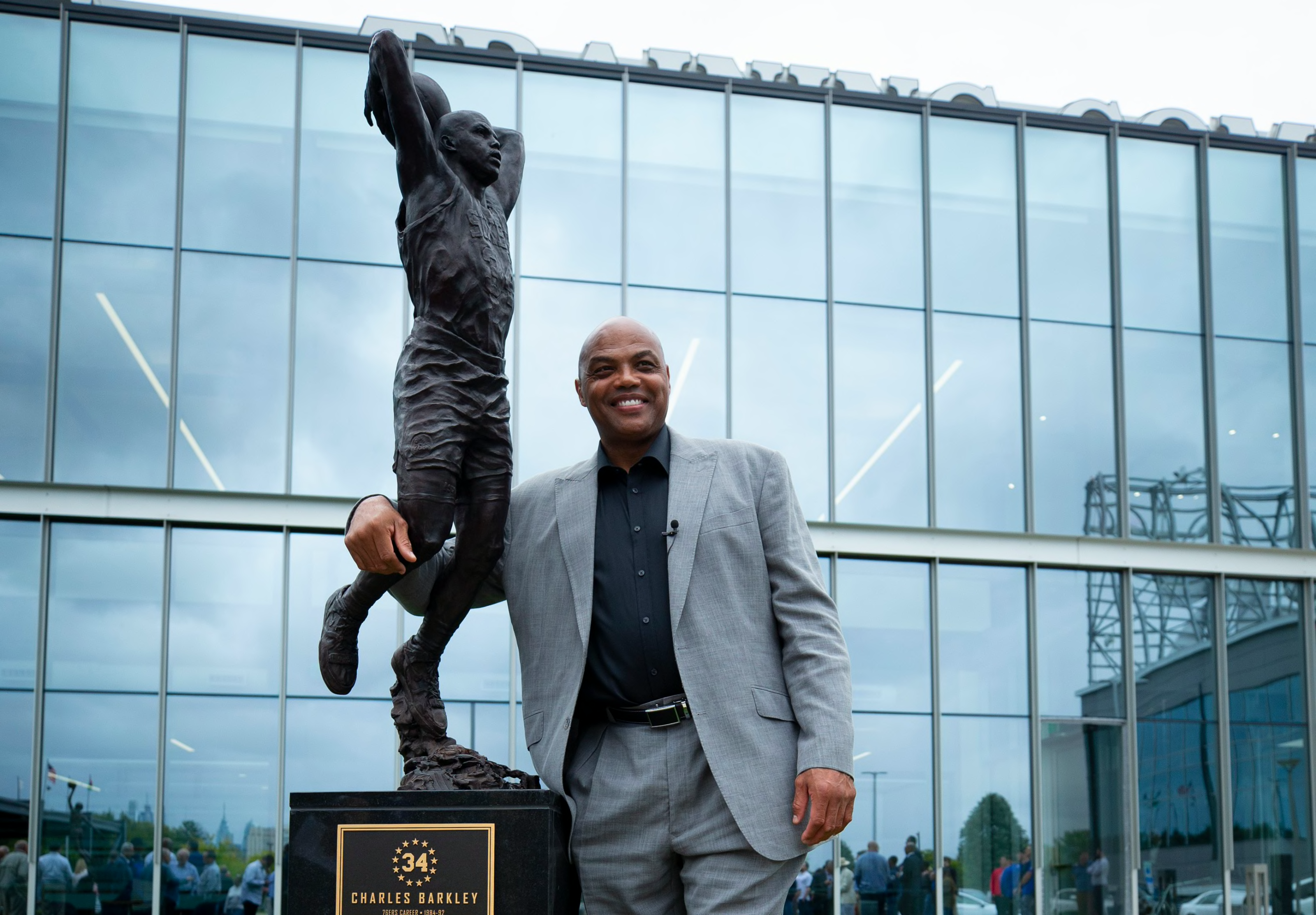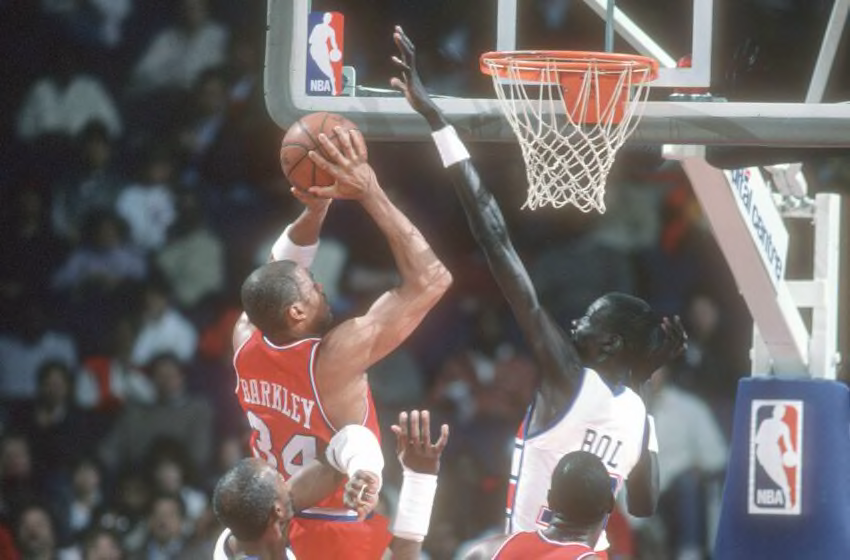Thirty years ago this week, the Philadelphia 76ers traded Charles Barkley to the Phoenix Suns. How would things have changed if they never made that trade?
Regardless of whether the Warriors win the Finals — as I write this, they are a game away — I do not care how this series defines Stephen Curry’s legacy or if it cements his place in the pantheon over Moses Malone or Moses Guthrie. These are topics better suited for well-compensated pundits and journalists who don’t feel like making cold calls.
To me, the source of Curry’s greatness is similar to others: he evokes constant wonderment. He looks like a teenager — the convenience store cashier beard and bulging arms only highlight the cherubic face. Every incredible 3-point heave, every nimble, twisty lay-up is an illusionist’s finale. How did he do that? His shooting touch is so pure that if he misses it’s incomprehensible, like the sun not rising. The more people yak about Curry’s ranking — as ESPN’s bus stop assemblage of talent did during one pre-game show — only makes me appreciate him more now. I’ll get to tell my kid about what I saw.
I won’t lead with the titles. That’s not the beauty of Steph’s lore.
The same applies to Charles Barkley.

Charles Barkley poses for a picture with his sculpture at the Philadelphia 76ers training facility on September 13, 2019 in Camden, New Jersey. (Photo by Mitchell Leff/Getty Images)
Curry’s legend status has made me think about Barkley, who 30 years ago this week was traded from the Philadelphia 76ers to the Phoenix Suns, a blockbuster deal that lived up to the hype. Barkley won league MVP while leading the Suns to the 1993 Finals. (They lost valiantly in six games to the Bulls. Thanks, John Paxson.)
That was it. Barkley never made another Finals, thanks to a plucky 1995 Rockets team and Karl Malone doing his best Forrest Gregg impression in the 1997 Western Conference Finals.
Would things have been different for Charles Barkley if he stayed with the Philadelphia 76ers?
But what if Barkley had never left Philadelphia? Would the Sixers have put it all together? Could the Suns have won a championship without Sir Charles? Thanks to simulations built by Strat-O-Matic, the Market Leader in Sports Simulation, we can find out.


The short answer is “no.” The longer is “no and it doesn’t matter.” And not because Barkley became the NBA’s version of John Madden, a sports figure who has universal likability. (San Antonio and San Francisco excluded.)
Anybody who watched Charles Barkley play, especially in his Philly heyday, cherishes him. Watch the highlights. Before he was tethered by a bad back, Chuck was the Tasmanian Devil in red shorts. In those Philly highlights, Barkley runs the court like an 18-wheeler without breaks, downhill. He attacks the rim like he’s sprung from a trampoline. He did not shy away from anyone. “It’s all about having supreme confidence,” he said in Super Slams of the NBA, “and not many guys have it.” Here was a 6-foot-4 power forward who rebounded like a maniac and dominated inside during the big-man splendor of the 1980s. And he had personality. Personality goes a long way.
As great as Barkley was, he never had a supporting cast to match his talents in Philly. General manager (and beloved raconteur) Pat Williams scored a coup with Barkley in the 1984 draft. But Williams and his successor, John Nash, couldn’t replenish an aging squad. Bobby Jones retired in 1986; Julius Erving a year later. Andrew Toney’s feet went to hell — as did his goodwill toward the 76ers. Two trades in 1986 submarined the team’s future. Roy Hinson. Jeff Ruland. Just mention those names to Sixers fans. Their pained moans say everything.
Barkley had to shoulder the load. From 1986-87 to 1991-92, he played with only three All-Stars, Maurice Cheeks, Julius Erving, and Hersey Hawkins. It’s really two since Erving, far from his apex, made the All-Star Team as part of his farewell tour. How many times were Cheeks and Hawkins anointed? Three, and Mo got two of them.
I started to really follow basketball in 1992. Barkley was a fixture on NBC and TNT. I knew him as a supernova thanks to NBA Entertainment. In Phoenix he was … different. In the post, he was methodical, using his bulk to overwhelm defenders, and expertly passing out of double teams. He was a deadly mid-range shooter. Barkley was great in Phoenix, where he had superior teammates. It was like watching a young, brilliant actor in independent movies join a superhero franchise. There’s more fame and more mainstream success, but the shine isn’t as bright. Look, I’m thrilled more people know about Brie Larson, thanks to Captain Marvel, but man, she was something in Short Term 12.

Manute Bol of the Washington Bullets goes up to block the shot of Charles Barkley of the Philadelphia 76ers during an NBA basketball game circa 1986 at the Capital Centre in Landover, Maryland. Bol played for the Bullets from 1985-88. (Photo by Focus on Sport/Getty Images)
The obsession with rings diminishes a player’s value. You’ll remember Charles Barkley, the special player and beloved commentator, warmly. Will we treat Robert Horry the same way? Or Lamar Odom? It’s not just Barkley who suffers this distortion. Elgin Baylor revolutionized how basketball was played by going airborne. He never won a championship — the Celtics wouldn’t allow it — yet the Lakers built him a statue. Bob Lanier never sniffed the NBA Finals in his Hall of Fame career, but as the players association’s president, he helped get the league’s salary cap and drug policy up and running. John Stockton and Karl Malone turned the pick-and-roll into high art. The lack of a championship doesn’t disqualify their contributions. Same with Pete Maravich, Dominique Wilkins, and Allen Iverson.
“I like my career,” Barkley told Dan Patrick recently. “I know I didn’t win a championship. I like being myself. I’m not sure when it got to the point where [championships] became an individual thing instead of a team thing.” Barkley corrected himself. He says that started when LeBron James and Kevin Durant became part of super-teams in Miami and Golden State.
A championship doesn’t exempt great players from scrutiny. Wilt Chamberlain, the most dominant player of his era, will always be faulted for winning two. Michael Jordan’s baseball hiatus leaves a great question unanswered: could the Bulls have won eight in a row? Even Bill Russell’s 11 rings in 13 seasons get sent to the time machine. Well, that was back when he played against plumbers … I guarantee when LeBron retires, which should be shortly before the sun burns out, the bitching will commence. Four rings? An admirable record of philanthropy and social activism? But you left a few chips on the table, ‘Bron.
This kind of debate is to be expected, but it can’t define a player’s existence. It’s not fair to them. And it’s not fair to us: we cannot enjoy what’s in front of us. Right now we have basketball’s most ebullient TV personality and one of its most special talents. Legacies can wait.